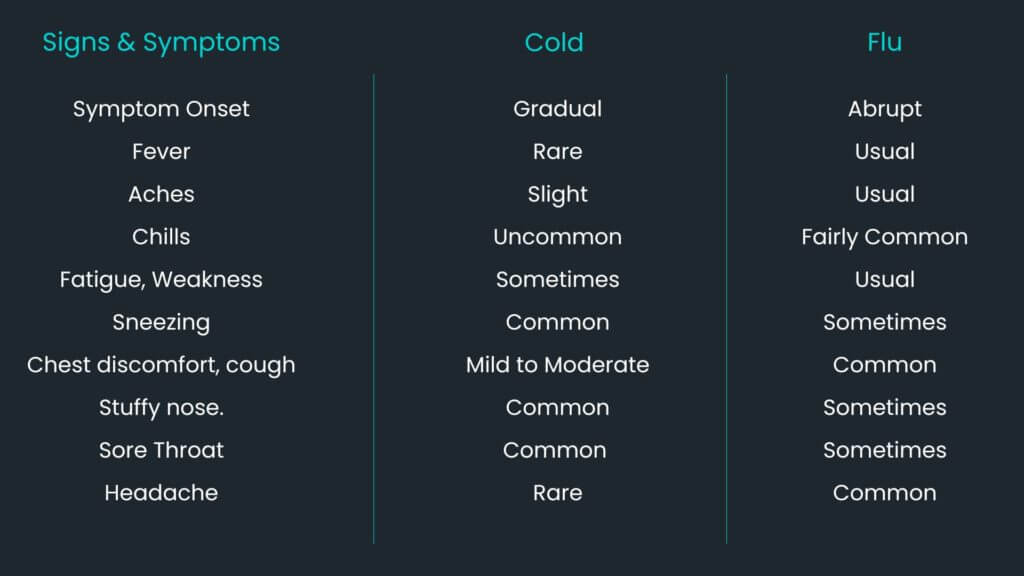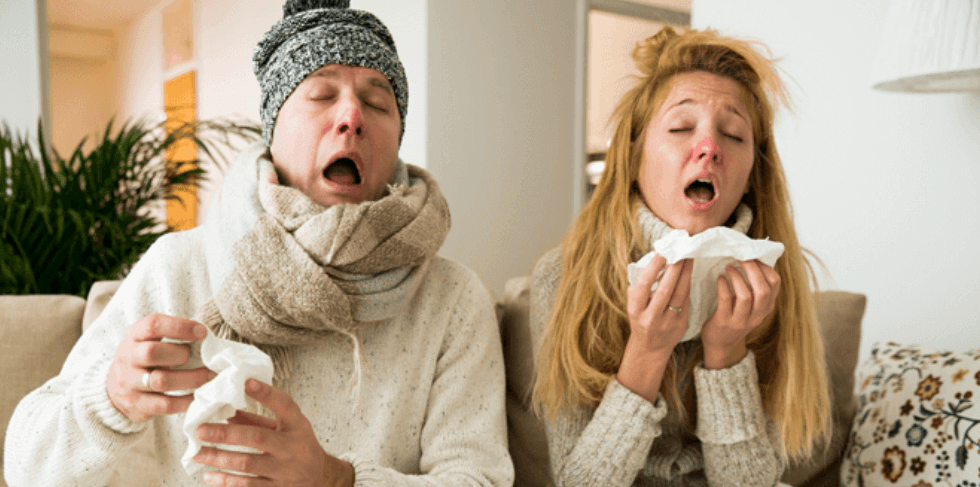As we arrive on the doorstep of the festive season, we also reach peak flu season. Almost everyone will have a slight sniffle, a hint of a sore throat or just a general feeling of being under the weather. During these colder months, when we spend more time indoors and in close proximity to our loved ones, it’s often just a matter of time before we pick up a cold or the flu (especially if you have kids in creche/school!). But that doesn’t mean you have to suffer through it. Here, we have gathered some tips on how to relieve cold and flu symptoms, how to prevent the spread of these viruses, and to support your immune system!
Cold Vs Flu
Influenza (flu) and the common cold are both contagious respiratory illnesses but they are caused by different viruses. Because the flu and the common cold have similar symptoms, it can be tricky to tell the difference based on symptoms alone. However, in general, the flu will be worse than a common cold with more intense symptoms. The flu is also more likely to come on quite quickly, whereas you may be able to feel a cold develop over the course of a few days.
Is It A Cold Or The Flu?
Common cold symptoms are usually milder than symptoms of the flu and you are more likely to have a runny or stuffy nose. In contrast, the flu often causes fever or chills, cough, sore throat, muscle/body aches, headaches, and fatigue along with a runny or stuffy nose. Here are some of the main differences between the common cold and flu.

Remedies and Treatments That You Can Try At Home
As mentioned above, we have gathered some practical tips to help you relieve cold and flu symptoms and have you right as rain in no time!
Runny Nose
A runny nose is pretty common with a cold and it can become quite irritating. Constantly wiping your nose can leave the skin around the nose dry and sore. To prevent damaging the delicate skin of the nose, try using petroleum jelly as a barrier. This will reduce friction between your skin and the tissue and will help your skin retain moisture. During the night, you can also use a thick moisturiser to help your skin stay hydrated.
Congestion
Congested sinuses can leave us feeling bunged up and miserable but there are ways that you can help ease it. Nasal saline sprays and Olbas Oil will help to clear a blocked nose. Try adding a couple of drops of Olbas Oil to a bowl of hot water and holding your head over it for a few minutes for full effect. You can also use Olbas Oil on the go by adding a couple of drops to a tissue. You can hold this tissue under your nose and inhale deeply a couple of times to feel the effects.

Temperature
When we are ill, our temperatures will rise slightly as our immune systems kick into gear. This immune response works in two ways. A higher temperature in the body speeds up how cells work, including the cells that fight infection. A higher body temperature may also make it harder for bacteria and viruses to reproduce in the body.
However, it can also make us feel rather uncomfortable. Paracetamol and ibuprofen (if you’re able to take these) will help to relieve fever and achy muscles but you should always stick to the recommended dose. Please take extra care if you are using products that contain paracetamol, such as Lemsip or Solpadeine, so you do not exceed the recommended total daily amount of paracetamol (4 doses or 4 grams in 24 hours). Ask your pharmacist for advice if you are not sure. You should also check with your pharmacist before taking medication if you’re pregnant or breastfeeding. Your pharmacist will also be able to help you if the medicine is for a child or baby.
A cold compress and drinking plenty of cold liquids can also help ease discomfort. However, we recommend using a damp flannel or an ice pack wrapped in a towel; holding ice directly on the skin for long periods can damage the skin.
Sore Throat Remedies
There are several sore throat remedies that you can try to ease symptoms. Firstly, you can pay your local pharmacy a visit and try some over-the-counter lozenges or throat sprays. Many of these will help reduce pain and aid healing.
If you find that you have a sore throat, particularly when swallowing, you can try gargling salt water. Simply dissolve some salt in warm water and gargle it for a couple of seconds before spitting it out – do not swallow it! This can temporarily relieve scratchy or sore throat symptoms. Likewise, a spoon of honey can work too.
Achy Muscles
Whether you have a cold or the flu, you might experience achy muscles and it can be quite uncomfortable. As mentioned above, paracetamol and ibuprofen can help with this. Please note, not everyone can safely take these medications – if you’re unsure or need advice, please speak with your local pharmacist. You can also try taking a warm bath or shower. In addition, you can try a cold compress to help reduce inflammation or a hot water bottle to help increase blood flow to the area. Gently stretching and massaging the muscle might also help.
Prevention Is Better Than Cure
As with every illness, prevention is always better than cure. If you feel unwell, it’s your responsibility not to pass it on to other people. Therefore, if you have cold symptoms, you should:
- Cover coughs and sneezes with a tissue or your sleeve – not your hands!
- Wash your hands often with soap and water for at least 20 seconds.
- Wear a mask when in public if you need to go out.
- Work from home if possible until you feel better.
- Avoid close contact with others – no kissing, shaking hands or sharing eating utensils.
- Clean frequently touched surfaces like doorknobs and mobile phones.
- Avoid contact with vulnerable people – infants, people with weakened immune systems and elderly people.

Tips for Supporting The Immune System
You can also help reduce your own risk of picking up colds and the flu by supporting your immune system! The immune system is the body’s way of protecting itself from infection and disease; it fights everything from cold and flu viruses to more serious conditions. The immune system is complex and it can be influenced by many different factors, but there are some things that we can do to help support it.
Eating Well
To fight off infection, our bodies need fuel. The best fuel for a happy and healthy body is fresh, whole-plant foods. We should try to get as many fruits, vegetables, nuts, seeds, and legumes into our diet as possible. Each plant food will have different vitamins and minerals so if you can, you should try to vary your diet where possible.
Fibre in plant foods is also important. This fibre feeds your gut microbiome (the community of friendly bacteria that live in your gut). A robust microbiome may help to improve and support your immunity. In addition to vegetables and fruits, you can add fermented foods to your diet to help your gut microbiome flourish. You can try:
- Kombucha
- Kefir
- Tempeh
- Miso
- Sauerkraut
- Kimchi
- Probiotic yoghurts
Vitamin C, vitamin D, and healthy fats may also help support your body’s immune system. You can find vitamin C in citrus fruits and healthy fats in plant oils, such as olive oil and avocados, or oily fish, such as salmon, mackerel, and sardines. During the sunnier months, we tend to get enough vitamin D from sunshine, however, that isn’t the case during the winter as we have very short days. You can get some vitamin D from oily fish and some vegetables but it is advised that you take a vitamin D supplement from October to April to make sure you’re getting enough!
Staying Hydrated
While hydration doesn’t necessarily offer any protection from infection, it is important for your overall health. When we become dehydrated, our bodies cannot function properly, this includes the immune system. Therefore, you may be more susceptible to illness if you are dehydrated.
To make sure you are properly hydrated, you should try and drink at least 8 glasses of water per day. How do you know if you’re getting enough water? Easy. If you are properly hydrated, your urine should be a very pale yellow.
While tea, coffee and fruit juice will count towards your daily fluid intake, you should try and stick to water as much as possible. Sweetened tea/coffee and fruit juices contain high amounts of sugar. Why not try adding some cucumber or lemon slices to your water to add a hint of flavour?
In addition, when you’re ill with a cold or flu, it’s important to stay well-hydrated. Many cultures use warm liquids to help ease cold symptoms as they can help soothe a sore throat and might ease congestion by increasing mucus flow…plus, they feel comforting when you’re not feeling your best! You can try a nourishing soup, tea, or hot water with honey and lemon.

Managing Stress and Getting A Good Nights Sleep
Both stress and poor sleep quality can impact the immune system negatively and more often than not, they are linked.
When we are stressed or anxious, our body tends to activate the “fight or flight” response. This means that it prepares us to either fight or run away in order to keep us safe. Whilst this sometimes comes in handy (more so for our caveman ancestors, thankfully) it can also be detrimental to our health if it happens too often. When this response kicks in, the body suppresses other processes so it can concentrate on the processes it needs to get us to safety. This can mean that the immune system is suppressed… not ideal during flu season!
- Not getting enough sleep can also negatively affect the immune system and inadequate or poor sleep quality can be linked to a higher susceptibility to illness. Adopting a relaxing nighttime routine can help improve sleep quality. For instance, you can try:
- Limit screen time for an hour before bed – the blue light emitted from devices may disrupt your circadian rhythm (the body’s natural wake-sleep cycle).
- Sleep in a quiet, cool, dark room – use an eye mask and eye plugs if you need to.
- Try going to sleep and getting up at the same time every morning/night.
- If you find that you’re sleeping poorly because of stress, you can try some stress management techniques, such as mindfulness meditation or journaling.
I’m feeling under the weather and I’m not getting better, even with over-the-counter medications
If you have been feeling unwell for a number of days with no improvement, you can always speak to a Webdoctor.ie GP via our online video consultation service – you don’t even need to get out of bed. However, it is important to note that antibiotics will not relieve your symptoms or speed up your recovery if you have a viral infection (a cold or flu) – antibiotics are only effective against bacterial infections.
If you would like more health and wellness content, you should join us on Instagram, Facebook and Twitter!






